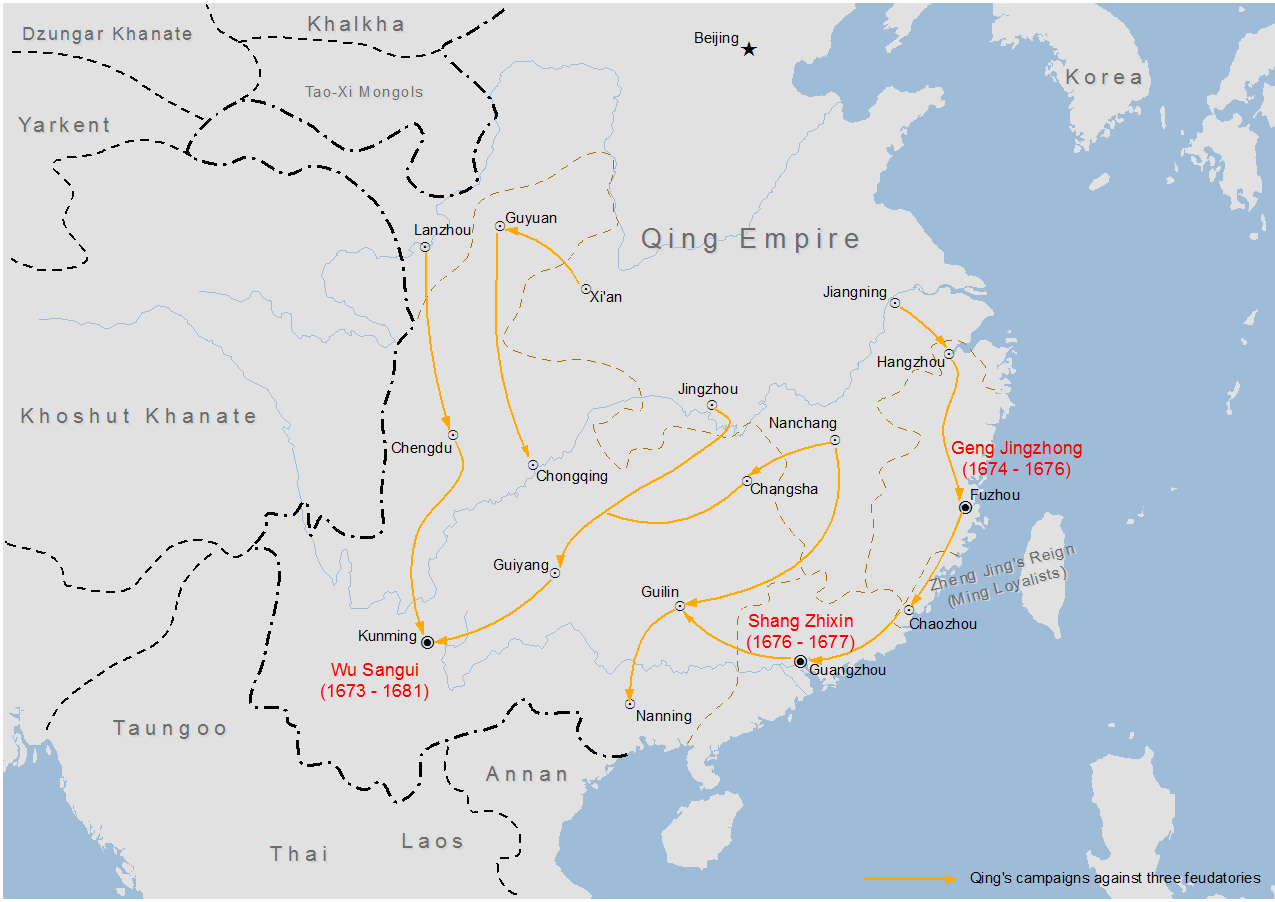Geng Jingzhong on:
[Wikipedia]
[Google]
[Amazon]
Geng Jingzhong (; died 1682) was a powerful military commander of the early  Firmly entrenched as a quasi independent ruler in
Firmly entrenched as a quasi independent ruler in
Qing dynasty
The Qing dynasty ( ), officially the Great Qing, was a Manchu-led Dynasties of China, imperial dynasty of China and an early modern empire in East Asia. The last imperial dynasty in Chinese history, the Qing dynasty was preceded by the ...
. He inherited the title of "King/Prince of Jingnan" (靖南王) from his father Geng Jimao, who had inherited it from Jingzhong's grandfather Geng Zhongming.
The "Dolo efu" (和碩額駙) rank was given to husbands of Qing princesses. Geng Jingmao managed to have both his sons Geng Jingzhong and Geng Zhaozhong (耿昭忠) become court attendants under the Shunzhi Emperor
The Shunzhi Emperor (15 March 1638 – 5 February 1661), also known by his temple name Emperor Shizu of Qing, personal name Fulin, was the second Emperor of China, emperor of the Qing dynasty, and the first Qing emperor to rule over China pro ...
and marry Aisin Gioro women, with Prince Abatai's granddaughter marrying Geng Zhaozhong 耿昭忠 and Hooge's (a son of Hong Taiji) daughter marrying Geng Jingzhong. Geng Juzhong married Princess Heshou Roujia ( 和硕柔嘉公主) of the Manchu Aisin Gioro clan and daughter of Prince Yolo ( 岳樂), Prince An.
 Firmly entrenched as a quasi independent ruler in
Firmly entrenched as a quasi independent ruler in Fujian
Fujian is a provinces of China, province in East China, southeastern China. Fujian is bordered by Zhejiang to the north, Jiangxi to the west, Guangdong to the south, and the Taiwan Strait to the east. Its capital is Fuzhou and its largest prefe ...
, in 1674 Geng Jingzhong rebelled against Qing rule along with the other two of the Three Feudatories Wu Sangui
Wu Sangui (; 8 June 1612 – 2 October 1678), courtesy name Changbai () or Changbo (), was a Chinese military leader who played a key role in the fall of the Ming dynasty and the founding of the Qing dynasty. In Chinese folklore, Wu Sangui is r ...
and Shang Zhixin, who were also governing enormous principalities in south China. On November 6, Yanping fell to armies commanded by Jieshu, Qing armies eventually defeated Geng, who surrendered in 1676 and pledged his support to putting down the other revolting feudatories. The Qing then used Geng's troops to fight the other feudatories until the civil war ended. Soon after the Qing final victory in 1681, the Kangxi Emperor had Geng executed by slow slicing for treason
Treason is the crime of attacking a state (polity), state authority to which one owes allegiance. This typically includes acts such as participating in a war against one's native country, attempting to Coup d'état, overthrow its government, spy ...
.
Geng Jingzhong's brother Geng Juzhong was in Beijing with the Qing court with the Kangxi Emperor during the rebellion and was not punished by the Kangxi Emperor for his brother's revolt. Geng Juzhong died of natural causes in 1687. Geng Juzhong was a Third Class Viscount (三等子).
References
* 1682 deaths Chinese military leaders Qing dynasty generals Year of birth unknown People executed by the Qing dynasty Qing dynasty rebels {{China-mil-bio-stub